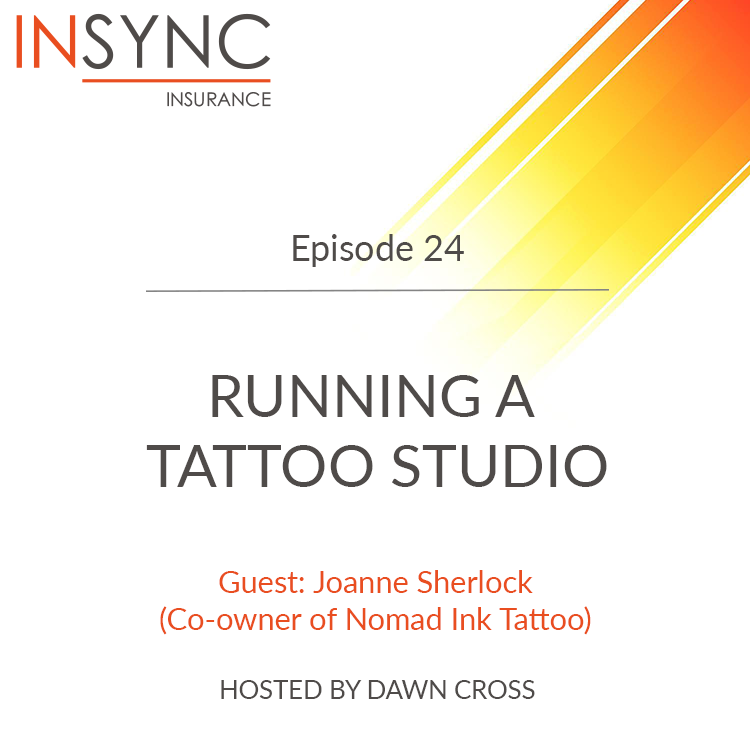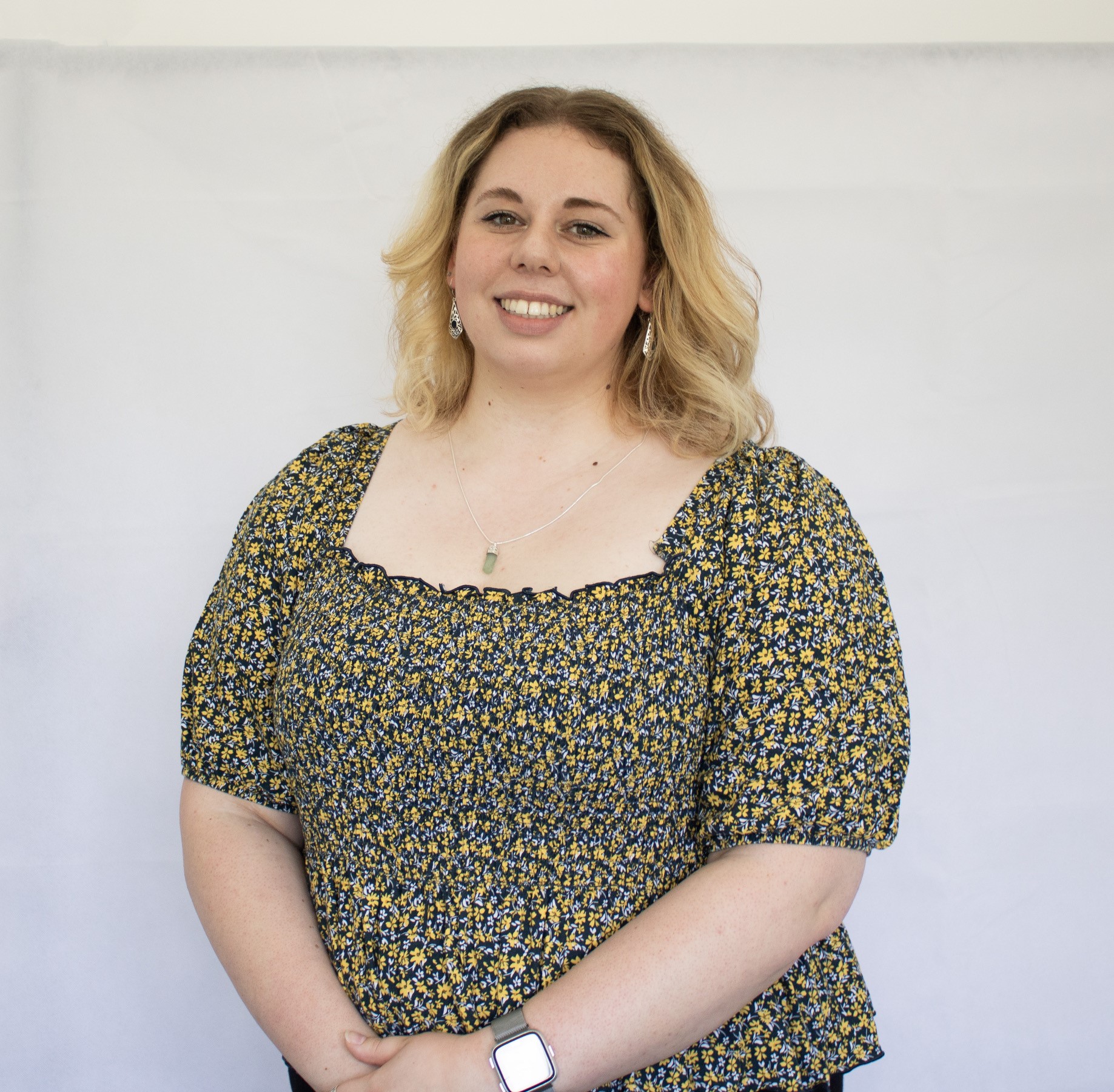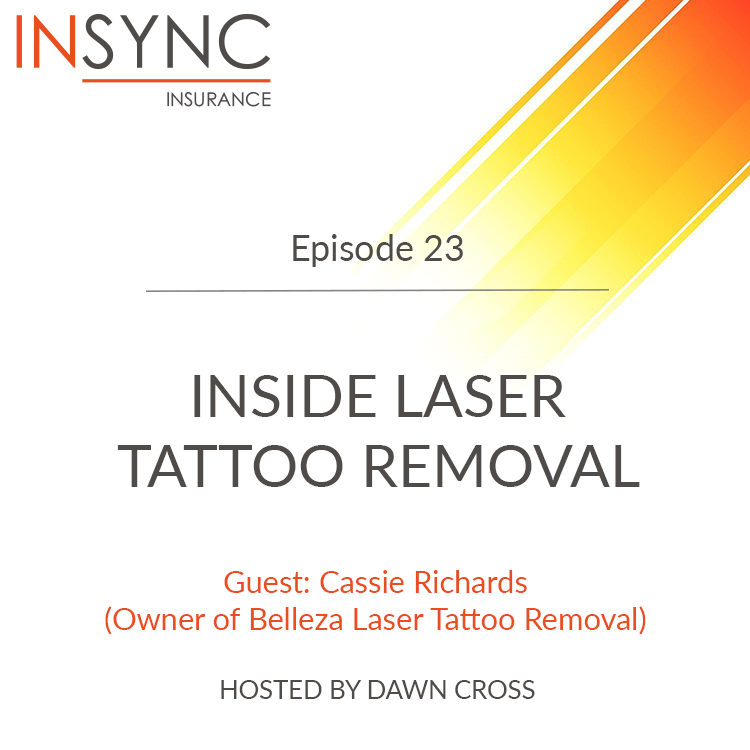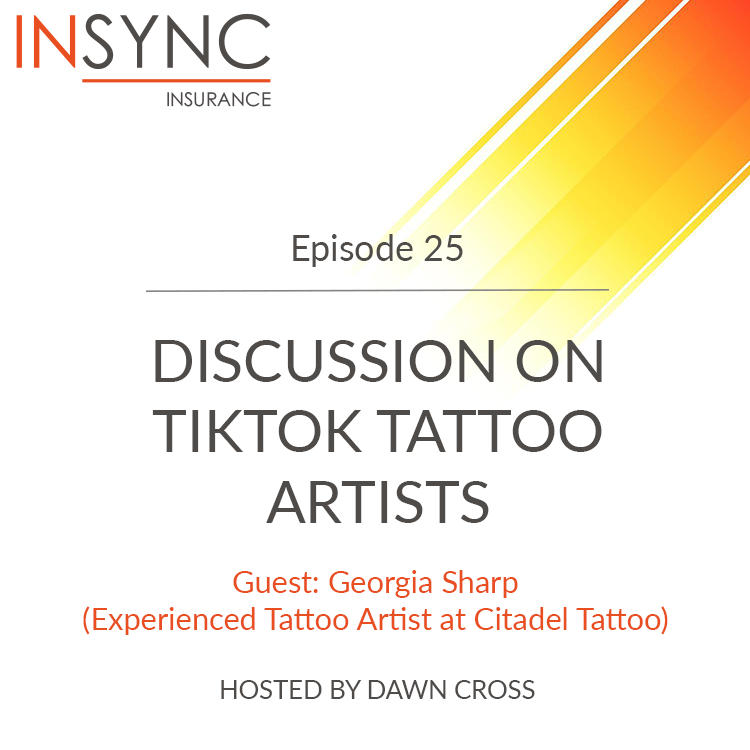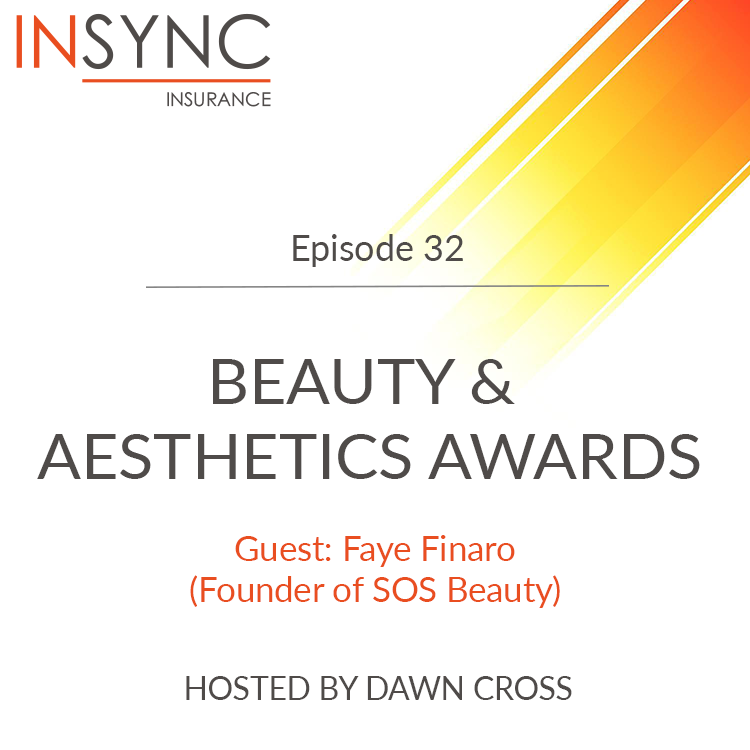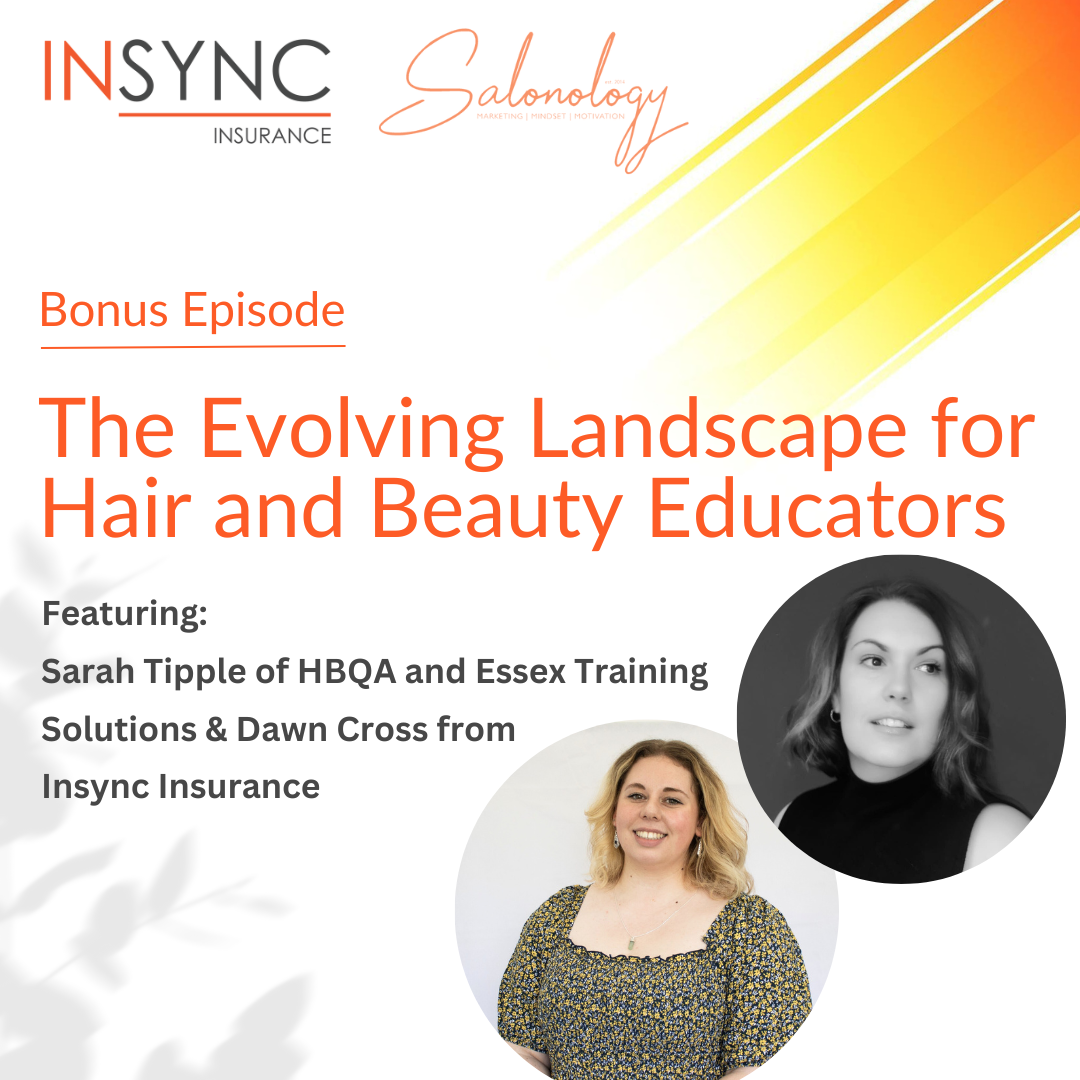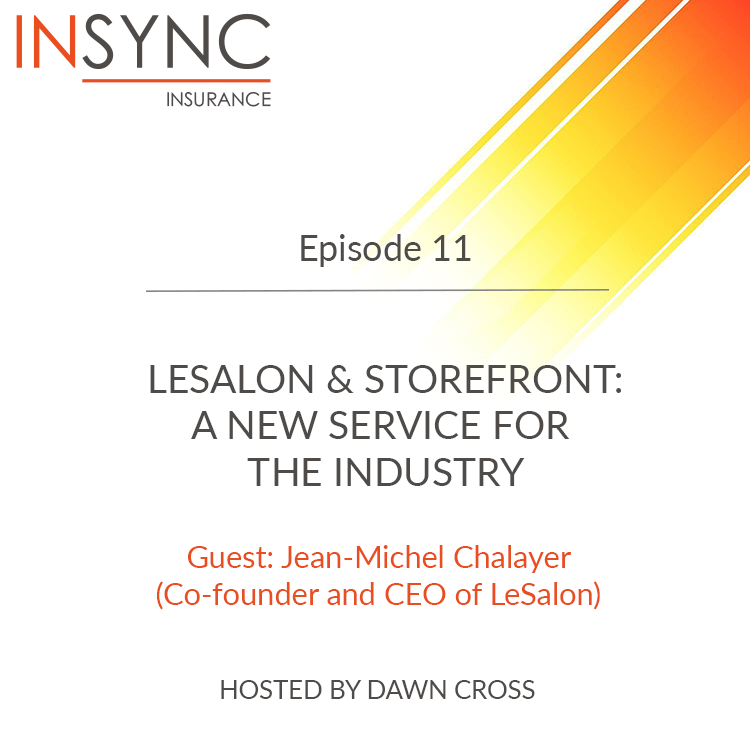Episode Transcript
Speaker 0 00:00:01 Welcome to the Insync Insurance Podcast. I'm your host, Dawn Cross, and today we'll be discussing running a tattoo studio with Joanne Sherlock, co-owner of Nomad Ink Tattoo. If you enjoy our podcast, make sure to leave a rating on your favourite podcast directory.
Brilliant. So could we start off with, could you introduce yourself and what you get up to?
Speaker 1 00:00:24 I can. I'm, um, Joan Sherlock. I own and manage a tattoos studio in wold just outside of, um, Liverpool. We've just had our fourth birthday, it was our fourth birthday party on Saturday. Oh, thank
Speaker 0 00:00:36 Birthday. Thanks.
Speaker 1 00:00:37 It's the actual anniversary on Wednesday. Put your, um, closed on Wednesday. Not opening for that. Did it? Did it? No, didn't blame you. No. Um, and yeah,
Speaker 0 00:00:46 So yeah, how did you get started and how did you become an owner?
Speaker 1 00:00:51 Right. Well, <laugh>, I worked in a completely different industry before. Um, me and my husband, who's a tattoo artist, we were, um, traveling Europe in the back of a self converted van and we just drove around for a couple of years. <laugh> living in That's great. Living on beaches and whatever, hence the name Noma Inc. Um, I did something completely different. I worked in business management and development in, um, the early years sector of education and he was a tattoo artist. And we got a little bit drunk, to be honest, one night and we drew a plan on the back of a pizza box that when we got back home we were gonna work together, which we both vowed we would never do. We were like dead separate careers, all that
Speaker 0 00:01:31 <laugh>,
Speaker 1 00:01:32 But we'd had a glass of wine, so we wrote this plan on him, the back of a pizza box and we just did that. So when we came home we just went, oh, okay, well then let's do that. So we um, opened a studio initially in Liverpool City Center, um, temporarily, um, while we were kind of working on the build of the one we've got now. So that was about six, yeah, about six years ago I would've thought. And um, I hadn't worked in the tattoo industry in industry before, had tattoos, obviously was, we weren't married then, but I was with a a, a tattoo artist. So like, you know, had plenty, but it was a completely different industry for me. <laugh>, I can tell you that. I just kind of figured if you can work in business development and management in one area, you can do it in another. How long can it be
Speaker 0 00:02:17 <laugh>? That sounds amazing. And obviously, you know, you are happy to do it and a lot of the skills, probably very much transferable as well.
Speaker 1 00:02:27 Yeah, they are Now the, the business is a little bit big. Yeah. When it was just the two of us, I was used to managing massive teams and having, um, like infrastructure, I suppose like back office staff. So yeah, I had, you know, if I needed something promoted, there was a marketing team as part of the company I'd be working for or there'd be a finance department or a payroll department. Um, and I, I don't think I ever really appreciated <laugh> any of those other departments until like I had to do it myself. But when it was just the two of us, cause I, I was used to managing big teams, I found it quite difficult and um, like having to grasp for every job that comes in when you knew was quite hard cuz I'd, I'd kind of taken on established businesses before, um, failing but established.
Speaker 1 00:03:15 So, you know, the, your audience knew you were there. Um, whereas this one, of course it's not, we came back, we'd been gone for a couple of years. So all of his customers had either gone elsewhere or you know, some hadn't, but a lot of 'em had, because we didn't know whether we were ever coming back When we left, we were a bit like, oh, I don't think we're ever gonna come back, to be honest, because of myself somewhere else. We had to kind of several all those ties, but it's customers. Um, so, but now that we're bigger and there's a team to manage and you know, I've done a lot of training in the um, like areas of business that I had no experience at all. Um, so yeah, we're all right now <laugh>
Speaker 0 00:03:52 <laugh>. No, it's great as well because you've kind of started from the bottom and then worked your way up to where you needed to be. It sounds like it's been very invaluable in terms of experience as well.
Speaker 1 00:04:04 Yeah, it has. I've probably got more transferable skills now. Like I, I didn't have any real marketing, um, experience and now I'm doing a master's in digital marketing. Mm-hmm. So I always think, you know, if it all went belly up, <laugh>, if one day they make a robot they can do a good tattoo and we are all out of a job, I'll, I'll go and do digital marketing somewhere else. It'll be fine.
Speaker 0 00:04:27 <laugh>, I think we're quite far off from that, so I think you're safe. Yeah.
Speaker 1 00:04:31 I don't think it's a lifetime. I hope not. Anyway, <laugh>,
Speaker 0 00:04:34 I think it is very, I I just don't see it happening or it'll kind of do like the basics or something, but then it's um, you probably won't be able to even just do shading properly cuz if you twitch and then it's like it can't sense where you are or something. That's it. That's, you got half tattoo. I dunno. That's how I can imagine
Speaker 1 00:04:52 <laugh>, I hope. Yeah, well I hope so. In the very in depth you've got to go. It's unlike to be able to tell those and I just think we're probably going back to an age where um, people with skills and trades are the ones who value the most and I'm awful that That's all right. People with some hands on skills. <laugh>.
Speaker 0 00:05:08 That's brilliant. So obviously you spoke a little bit about your experience kind of starting, uh, starting from fresh instead of the, starting from saying established. Uh, could you tell me a little bit more about what's been like when, like running a tattoo studio? Is there anything that's surprised you at all?
Speaker 1 00:05:26 It's been a bit of a mixed bag to be honest. I came from, um, quite a customer-centric environment. Mm-hmm. Um, and had, you know, spent my whole career, um, quite corporate in that respect. And the customers always ride when you're work in early years in particular, quite rightly, you can't do enough for children. You can't do enough for parents and it's never gonna be good enough for your customers either cuz quite rightly shouldn't be. They're your, they're their, that's their children. And then you come into the tattoo industry and it's as if the customer didn't matter at all. I was just amazed. I mean, I would hear some stories of course through my husband who he, he's been tattoo in a long time and I'd be like, oh, the artist on a bad day or maybe the studio. You know, no, it's as if the customer in the tattoo industry didn't matter at all.
Speaker 1 00:06:17 And I said that if we open a studio, I wanted it to be one that I felt like I'd be able to go to that I'd be comfortable going into because as somebody who's not very cool or like not very like alternative, you know, like scene alternative. Mm-hmm. I always found Tattoo Studios quite intimidating. Okay. Um, to go into and I'm quite confident and can be a little bit hard faced and I found them intimidating. So I think there's got, so I was thinking there's got to be a whole section of people out there that are like me mm-hmm. That are, you know, into body art. I was lucky enough I could go to my husband's studio, he had his own studio before we had this one together and I got mine there, but I felt like a second home. That's fine. Mm-hmm. I'd only been into other people's studios a handful of times and I hated it.
Speaker 1 00:07:06 Mm-hmm. So I always said if, you know, if we ever did work together and open up our own, the vision of that would be, um, for people like me really and, you know, men and women because people have this thing that, you know, tattoo studios, they're probably only intimidating spaces for women. They're not, not all men are kind of confident enough to walk in and there's people there with tattoos all over their face and heavy metal music playing and smoking. There's a lot of drug taken and drinking in tattoos studios, I just go, whoa, it's not <laugh>. You know, it's just, it's so far from what we wanted to create here. Um, so to be honest, it's been a little bit up and down because trying to carve a niche in a market that has got, um, other expectations. It's great when you find your audience because they're going, thank God, you know, <laugh>, I can actually, there's so there's somewhere for me, we're not looking to appeal to everybody here, but until you find them, you sometimes you really question yourself and you go, well what are we doing?
Speaker 1 00:08:06 We're the only ones not making any money <laugh> cause cause we're just not following that, that pattern. But, you know, we stuck to our guns and we had a really clear vision of who our customers were. Um, and found them. Found them in the end. <laugh> <laugh>. Um, so yeah, difficult and reward and a bit of a mixed bag on a practical level. We've taken on a huge building. Um, we bought a three story building started on the ground floor that had nothing. It barely had walls, it had holes in the floor, thankfully. Um, yeah, <laugh>, thankfully my um, husband and his family, my husband was a builder for 15 years before he was a tattoo artist and his family role. Yeah. So we just dragged in a lot of help and it's meant we could do the work ourselves. So that's been quite difficult.
Speaker 1 00:08:57 So we started just kind of one artist and me on the ground floor and just over time, you know, we've grown and we're over all three floors now. On a practical level that's led to quite a lot of work. But operationally, like I was saying, because we, we were looking to find customers that didn't necessarily have a corner of the tattoo industry they could go to. Mm-hmm. Um, it was, it was quite slow at the beginning because we weren't gonna compromise on our standards and the, and the things we do. I'll try and give you an example. Yeah. So you'll know this as well as me, I'm sure you go into a tattoo studio, you, there's an artist, there's a great big common room where everybody's tattooing and an artist is busy and you kind of have half a conversation over the person that's paying them to tattoo them about what you might want.
Speaker 1 00:09:49 And they go, yep, yep. Great. Pay your deposit and I, and I'll see it on this date and that's it. Yeah. And you walk in on the Davy tattoo, you see your design, you do that really British thing like you do when you get your hair done, you go Love it <laugh>. I love it. Thank you. Very well. Thank you for spending some time drawing that just for me way too polite to tell you that I hate it. Mm-hmm. <affirmative> or you know, there are a few things that I would change and you sit down on the chair and you get your tattoo and you leave and you go, oh, I'm not sure about that experience. What we do is, you know, you you everything by appointments only, consultations by appointments only. And we have a full design process, a design approval process, um, before any tattoo appointments even booked.
Speaker 1 00:10:34 So once designs are done, they're invited back in, um, take a look at it, make any changes they want. And we don't make any appointments until the customer's absolutely happy. So the the, when they arrive for their tattoo, it's actually their third visit to the studio. Okay. Um, and our artists only tattoo three days a week because the other two days a week are spent do bespoke design. And what it means is that artists aren't just having a look at what's in the book the next day and quickly throwing a design together the night before because it can't possibly be the best design it can be if it's just been done the night before when you're tired and you've been tattooing all day, it's factored into the artist's working week because we're wanting to take on this bespoke work. You need to factor in the time to design it.
Speaker 1 00:11:21 But that slows down the whole process. And then an industry that half relies on people's spontaneous decisions and we are going, whoa, slow down. You know, don't make this decision spontaneously. It's a massive decision. You are looking for a full sleeve. This is a whole limb. Let's make it, let's make it look, click the Instagram pictures that you're actually sending in people down and kind of charging them for the privilege of it taking forever. Yeah. Um, has been a bit of a difficult niche calve. Um, but it's been well worth it. Like well worth it because the artists aren't stressed, they're actually doing the work they want to do. Mm-hmm Um, so as a result what comes out is excellent. So yeah. Mixed bag. But now that we've found our feet a little bit, we Alright <laugh>?
Speaker 0 00:12:13 No, that sounds amazing. I really like the idea of, um, as well, I think if you are, uh, in an unfamiliar place, you know, especially for example going for your first tattoo going in, it can just feel intimidating anyway cause maybe you've not done it before. So what you're saying about having, like by the time you get to the third appointment or even, you know, you're actually getting tattooed on the fourth time you've walked in, you'll probably feel more comfortable with the place. And if you spend a long time there because you're getting a tattoo, it's not, you know, a quick thing, you know, you'll actually feel more comfortable and it's really great for the customer but also for the tattoo artist, then they can get to know the person a bit more as well. So there's just comfortable round, which sounds incredible.
Speaker 1 00:12:55 Yeah. I always think getting a tattoo is quite a vulnerable experience for people. Um, I don't know, not everybody feels like this and I get that we are not people that wouldn't dream of, but like there are some people who get a tattoo. Part of that experience is, you know, the big common room, the heavy metal music, the edgy environment, the tattoo artists might be having a drink or a smoke that for some people that is all part of the experience and there are studios for them and that's great. Mm-hmm. Um, but for us, and you know, there are a lot of people like me that just isn't, isn't the case. And I do think it was intimidating, um, before, I know I certainly felt that. Similarly, I don't think all artists want to work in that environment either. Um, all of our artists have private rooms, so all of our tattoo rooms are private.
Speaker 1 00:13:43 So you walk in, there's a reception and then each room has got, it's a different, obviously different part of the building. They've got their own and they can decorate it the way they want. Ah, you know, there's, there's TV in there so customers can choose what movies to watch, um, or like music and it just means that you haven't got a compromise with your other artists. You know, we've got one artist that loves musicals and is quite calm and serene and their room is for plants and that's the kind of tattooing that she does. All very botanical and quite girly. You know, we've got another artist who loves to do black work and horror. So his room is reflective probably of the kind of customers that are coming to him for that work. So it means that they don't need to compromise either. Um, and the customer is being tattooed in that vulnerable position in an environment that suits them because I think you're with somebody you don't know.
Speaker 1 00:14:36 Well even, even if with us you've only met them two or three, maybe four times and somebody's hurting you and you are probably in a state of undress and what a vulnerable position to be in. You know, and if that then is in a a, a massive room where there's lots of beds and there's lots of noise and everyone's being tattooed together and people are walking past and having a little look and you know, what are you up to And you're thinking, oh this is actually really, this is hurting me and you know, I'm a bit uncomfortable because you know, I might have me talk just pulled around me or yeah actually it's uncomfortable. So the whole purpose of it was to just kind of strip all that like cool away <laugh> and just make it, make it feel, um, a bit more accessible I think to um, people who just aren't really into that.
Speaker 0 00:15:29 Yeah, no it sounds amazing. Seemed if you are in like a big common room as well, the noise level, if you are sensitive to noise or maybe you've, you know, you're autistic and that sort of thing, it could be very overwhelming when you're ready having an experience that isn't necessarily within your comfort zone or maybe there's people who, you know, has a comfort zone of, you know, I love it when I'm getting tattooed, which is completely fair enough.
Speaker 1 00:15:50 Um Yeah, you do you it's not me <laugh>.
Speaker 0 00:15:53 Yeah. You know, and it's really great. Then you can kind of, you almost choose your experience because there's privacy and also the based on the artists, well you know, you were saying we're musicals, you know, you could easily just then watch Beauty in the Beast or something with them and have some time. Um, and just make it absolutely unique, which I think is amazing and you know, congrats to you guys being able to carve out that part and naturally thanks thrive in it as well. So I wanted to <laugh>, I wanted to pick your brains. You saying obviously you're doing a digital marketing masters, which funny enough, snap. So am I. Um,
Speaker 1 00:16:27 How are you <laugh>? Well, as I'm, I've just taken a little break. It's so hard
Speaker 0 00:16:31 <laugh>. It's honestly a lot of work. My brain is mush at the moment personally. Yeah. Um, I'd love to know a bit more about your kind of like tattoo marketing perspective and you're saying also about lasers, if we could go in a bit more depth about that.
Speaker 1 00:16:44 Yeah, so when I first started the marketing was like everybody, you've, I didn't have really much idea what to do. I had my own personal social media and that was about it. It was all a little bit ad hoc, um, wasn't very focused, wasn't very consistent and committed really. Mm-hmm <affirmative>, uh, I did a little bit of training. We've got a brilliant organization called the Women's Organization in Liverpool. Yeah. Um, and they support women in business, so female business owners to kind of get them off the ground with the basics of things to kind of introduce the topics and then it's kind of up to you to, you know, run off and learn more about that. Yeah. So years and years and years ago I got in touch with them and they really helped, um, point me in the right direction. So did that kind of exhausted me knowledge there and then did some more kind of online digital marketing courses.
Speaker 1 00:17:38 Still found I wasn't really getting anywhere. It was wondering why everybody else seemed to be way more successful than me and you know, nobody was watching and nobody was responding and you know, business was growing but it, I think that it felt like that was solely up the back of the quality of the tattoos. I don't think I was particularly influencing it. Um, and then over time started to find me feet started to find that as I was signing up for these digital marketing like online courses and then with different people, I was watching them thinking, oh I could teach this. Like I already know this. I'm already doing it. Um, because, because I've become much more focused particularly on um, Instagram and a little bit on TikTok, although I am TikTok resistant cuz I'm old. So I <laugh>, I get a little bit weirded out by it.
Speaker 1 00:18:27 <laugh>. Fair enough. And actually don't enjoy, I don't have any of my own social media anymore. I'm nearly 40 years old. I get a little bit like overwhelmed. Um, with social media, like you were saying before, if you somebody who does get overwhelmed with, you know, sensory things, social media, all that, you're not necessarily engaging with the companies that you like in that way either. So I try not to get too caught up on the fact that I'm not, you know, posting four times a day and I'm not, it's not necessarily who we are as a business either. So I've gotta balance those things. And then it kind of reached a point where I didn't have a marketing plan. Um, I found that I did my own planning for example, on a Sunday for the following week of content that I wanted to put out tattoos that had been done, different things like that.
Speaker 1 00:19:18 But I didn't have a marketing plan and I desperately wanted one and try as I might to try and find somewhere a corner of the internet that would just tell me how to do that. Um, everything that I read was completely different and I thought, right, I'm gonna train in it, I'm gonna train in it. I felt like I do all the jobs in this studio that aren't tattooing. So absolutely every single job that isn't tattooing or art is mine. And I reached a point where I needed help with it and I was either gonna need to take on marketing help or operational help. Um, I hate admin so I decided to take on operational help <laugh>, sorry somebody else. Cause well yeah, you just, I reached a point where I needed to play to me strengths and um, my time was better spent marketing the business than it was doing admin cuz who likes that?
Speaker 1 00:20:07 Not me. <laugh>. So that's what I did. So quite recently, earlier on this year, took on some um, administrative support. I've got receptionist now and some admin support and I applied to do a master's in digital marketing from absolutely nothing. I had my other degree, my undergraduate degree was in education. It was in something completely different, um, and really found me feet like massively enjoying the course. Got to the end of the phase module. I'm taking a break between the face and second. So I'm really early on in it. Um, just while I catch up on some different aspects of work. But in that time I've realized that as a small business, your marketing plan is your business plan. You there isn't another one <laugh>. Um, it's written, you know, and we are working from it and there's been massive improvements already and laser tattoo removal is on it.
Speaker 1 00:20:59 Um, which is kind of how we came about speaking together. When I emailed you back, it's because for me it was something I had thought about before but kind of thought, you know, maybe one day in the very distant future it might be so consider. And we had a laser therapist in a, in a different location that we would send a lot of people to. Um, and then through the beginning of the masters in digital marketing realized that we are massively missing a trick and that the laser tattoo industry is a supporting industry of ours, not an opposite industry. Mm-hmm Um, it's completely changed the way I think about it.
Speaker 0 00:21:36 No, that sounds absolutely amazing. And um, so do you recommend, uh, I guess part of your plan that you'll offer uh, laser removal in future?
Speaker 1 00:21:47 Yeah, it's difficult because you look and there were lots of studios that offer tattoo laser removal and then I started to do my research in these machines are massively expensive. You know, they're tens of thousands of pounds, some of them were hundreds of thousands of pounds. And I'm going, what? How are they getting these machines to do it Anyway, on fair, the research, you realize that the laser tattoo removal industry is as woefully unregulated as the tattoo industry. And actually what these are, are cheap machines. They're i p L machines, they're so, they're for hair removal, which isn't the right thing. So you don't, you know, they don't do a good job, blah, blah blah. Which is why you have lots of them open up and then close because people aren't returning as customers because it's not doing the right job. Mm-hmm <affirmative>. Um, and being who we are, you know, we now have got a reputation for um, well our customers trust us with the quality of the work and the quality of the materials.
Speaker 1 00:22:45 We're gonna have to feed that into laser tattoo removal as well. So only the best machines are gonna do. Um, and they are so expensive, it's untrue. I mean you can lease them, but again, it feels like another market that's gonna need to be carved a little bit. We're gonna be expecting people to pay more with us than they would with someone else, but of course the results are gonna be better. Mm. Um, you know, the training we would insist on would also be there, but it needs it. So some of the things that I learned as part of my studies in this is that last year or the year before, I think it was last year, tattoo laser removal as an industry took over the tattoo industry in terms of revenue for the first time. So laser tattoo removal as an industry, um, worldwide is now worth more than the tattoo industry.
Speaker 0 00:23:37 Okay.
Speaker 1 00:23:38 Um, so, and I think when I first got into the indu into the tattoo industry, my thoughts on it were having a tattoo studio with a tattoo laser removal service sent the wrong message. And then really quickly I realized, well that's stupid. That was wrong. You know, that's not the way it is at all because actually we do, we get so many inquiries for coverups. And I very quickly realized that laser tattoo removal is a key component in, you know, achieving successful coverups for people. And because we don't have one and you know, as much as I can go, go to this place, they're really good. They don't necessarily, so we end up turning them away or cover ups than we take because as a studio we're not gonna take it on if we can't make it look gorgeous at the end. Um, quite often it needs lightening with laser before you can do that.
Speaker 1 00:24:35 So we turn a lot of them away. So if we had one, we'd be able to offer that service in-house, um, as part of our tattoo service rather than, um, rather than opposing it. Which I think is probably the way I was thinking about it initially. Um, and yeah, I think as, as the technology's getting better and as you know, they're not banning people anymore cuz they're much better than machines and people are getting a little bit wise to that, I think it's a really important supporting industry to the tattoo industry. And like I say, it's overtaken it in terms of revenue and it's gonna be really important I think to our growth. Um, and I think as well thinking about things more personally, we are in an industry of making, of giving people body parts that they love. That's all very well and good on a blank canvas you go, yeah, great.
Speaker 1 00:25:28 Give it to us. And I know that any one of my three artists is gonna give you the kind of tattoo that turns heads in the street. I know that. But if you've already got a part of your body that's got tattoos on it that you just hate and you dread the summer coming because you think, oh I've gotta put a vest on or I'm gonna put shorts on, I've got this god awful tattoo that I've got when I was 16 in some bat studio. You know, if we, we need to be able to fix that for people. We need to be able to be the place that people go, um, for good advice, safe and reliable removal and then a coverup if that's, if that's what they're looking for. Um, so yeah, it's key. I think it's key to the growth and development of the tattoo industry.
Speaker 0 00:26:11 Oh that sounds great. And as well, like you were saying, it'd be really great to be able to lighten something, to work more color into something, you know, instead of just covering up with a big mass of, you know, pink, you know, and it's not as great as it could be to have that would be amazing and obviously make people happy at the end of the day. And then you've got beautiful artwork everywhere on everybody's bodies.
Speaker 1 00:26:33 Yeah. There's got enough reason to hate your body. Like let's not make the decisions that we made at 18 and 19 be one of the reasons to hate part of your body. And I think in theory anything can be covered, but we won't cover anything unless we can make it almost as good as it would've been had there not been a cover up there in the first place. Because the problem with that is if somebody comes in with something very dark and that covers all of the area that it sits in so there's no space alongside it to distract the eye with something else. Mm-hmm. The problem with, with compromising the artwork to do the cover up is that you've then got a very compromised tattoo walking around out there from here, from us, from anywhere, from Nomad Inc. So when people go, well who did your tattoo?
Speaker 1 00:27:21 They don't go, oh, it was Lewis at Nomad Ink, but it was a coverup and he was really compromised and that's kind of why it looks a bit like that. They just go, it was Lewis at Nomad Ink. Mm. And that's really poor it, it's counterproductive as a business trying to grow off the back of excellent tattoo in. So sometimes we kind of have to go, I'm really sorry I'm not gonna try and cover that because to cover it, the design would have to be so poor, it'd have to be compositionally poor, it'd have to be too dark, it'd have to, you know, have no breathing room at all, um, that it's not gonna make a good tattoo. So actually if you can go, go get three sessions of laser on it, break it up so that it's not quite so dark and then let's make something lovely, it's good business practice because then you ha you are not then tempted to take on cover ups that just you are not gonna get a good result from. Hmm.
Speaker 0 00:28:15 Oh definitely. So moving on to our final question for today. Uh, what would you tell those looking to get into the tattoo industry? Whether it be from an artist or maybe uh, like you doing more marketing or kind of running a studio?
Speaker 1 00:28:31 I get asked this a lot by people who come to us for apprenticeships and things and my advice is gonna be really different to other studio owners advice because I'm coming at it from a completely different perspective. So I'll explain. The artists in our studio are all niche. We've got one portrait artist all he does realism and portraits. We've got one illustrator. She was a commissioned illustrator before she was ever a tattoo artist. And we've got one black work and lime work artist. They're all canvas artists. They were all commissioned canvas artists before they ever learnt a tattoo. And tattooing is just another medium that they use. So they're also, you know, I've got two that work in oils. I've got one that works in um, watercolor and acrylics as well. Got one that airbrushes as well. Actually he did that for years before he was a tattoo artist.
Speaker 1 00:29:24 And what that means is that if they're doing their niche, their specialism day in day out, that they become excellent at it. And the problem with the tattoo industry as a whole is that you walk into a studio and the studio just wants to make as much money from you as they can. So what they need is an all rounder that can do anything that walks through the door when actually what that means is that it stops you from ever become an excellent at the tattoo or art style that really calls you, that really sings to you. Because how can you be, if you, if you could spend 40 hours a week doing illustration, you are very quickly gonna become excellent illustration. If you are spending 40 hours a week doing names and infinity signs, when you desperately wanna be a caller illustrator, you're never gonna get there.
Speaker 1 00:30:16 So when people come to us and I ask to see their portfolio, even if we're not looking for an apprentice, because I try and make sure everyone gets a great experience of reaching out to the studio. So I'll try and give advice if it's wanted. I ask first. Nobody wants on to listen advice <laugh>. If they want advice I'll try and if they send me a portfolio and I can't see who they are as an artist, um, I send them away to work on it again and say to them that have a look. Don't just look at what's local, get online and see who the world's best tattoo studios are and have a look at these studios that they work in. And I bet them, and everybody else that works there have all got their own niche and it means sometimes turn and work away cuz it's not your thing, but it means that much quicker.
Speaker 1 00:31:05 You end up with all your customers want all your work and all your bespoke, you can put out designs and people go, I know who did that because that's what it looks like. Um, you can do training courses with your favorite artists. Our realism artist, um, has done two training courses with one of the world's best realism artists. Um, he travels to London to do those because why wouldn't you, you know, if you are really sure of who you want to be as an artist, it means that you can invest and know that it's a good investment. Um, so my advice would be if you want to be an artist in this industry, figure out who you are as an artist. Look at the world's best in that style, the world's best. Don't look at the other studio down the road or the studio around the corner.
Speaker 1 00:31:52 Look at the world's best artist in that style and aim there. Um, because the kind of studios that you want to work in are looking for that. You'll find it easier to walk into one and go, I wanna do all your studio work that really suits some people, that it really does suit some people. But if you don't want to be doing that forever and ever and ever figure out who you are and aim there, even if it means it fair, it takes a little bit longer. Um, because this industry is full of all rounders that can put your names on and your infinity signs on. We don't need any more of them <laugh>, we need excellent artists in their own right to learn how to tattoo. Um, and that's where all your worlds best are coming from. They all do art in other mediums, not just in tattooing. Um, so that would, that is always my advice to people that come, um, looking for apprenticeships and looking for a little bit of to be pointed in the right direction really.
Speaker 0 00:32:49 That's absolutely brilliant. Was there anything else you'd like to add before we close out the episode there?
Speaker 1 00:32:53 There was one, there was one thing about le about laser tattoo remove. That's one thing that I'm meant to say when you were asking about, um, how the course has kind of helped pushes in that direction. One of the things that I did learn was that the, there's been multiple studies lately over the last couple of years about like perceived employment, suitability of people with tattoos. And I think that's really key in our industry to the shift, um,
Speaker 1 00:33:19 The, the, the mindset shift towards people with tattoos. There's been a massive change there because we've now passed the 50% mark certainly in this country of people with tattoos and without, there's been a massive shift. All of the studies have concluded that perceived suitability for employment of people with tattoos is improving very, very quickly. And actually there are some industries that are actively seeking out people with a more alternative look to work in their stores to future-proof their businesses. Um, Burberry I think was one of them because it means that when young people are walking past, they see people that look like them in the store. When they go in the, the way that links to laser tattoo removal is all of the studies found that it wasn't actually people having tattoos that got in their way in certain circles, it was the type of tattoos that they had. So poor tattoos, tattoos, then quality tattoos was actually the thing that got in the way rather than having tattoos itself. And I think the laser tattoo removal industry is gonna be key in that shift continuing, um, that mindset shift continuing around the, the employability of people with tattoos because it's now being shown that, like I say, lots of industries, it's not having tattoos that is getting in your way. It's the standard of the tattoos that people have got.
Speaker 0 00:34:46 Oh, definitely. Well, thanks so much today for sharing your knowledge. It's been really great to speak to you further on, I guess like a different perspective than a tattoo artist.
Speaker 1 00:34:56 Yeah, thanks for asking me. They probably would say completely different things, but there we go. <laugh>
Speaker 0 00:35:02 Thank you to my guest today, Joanne Sherlock, for speaking with me on our experience as a tattoo studio owner. If you're interested in learning more about the studio, please visit the link in the description. I have been your host Dawn Cross and tune in next week for another episode.
Insync is one of the UK's fastest-growing insurance providers offering comprehensive of cover for SMEEs and the self-employed across the UK. Our expert team can tailor your insurance to meet your individual business needs and compare prices from our Lloyds of London-approved partners. We offer a five-star service and have been Feefo platinum trusted winners four years in a row.
